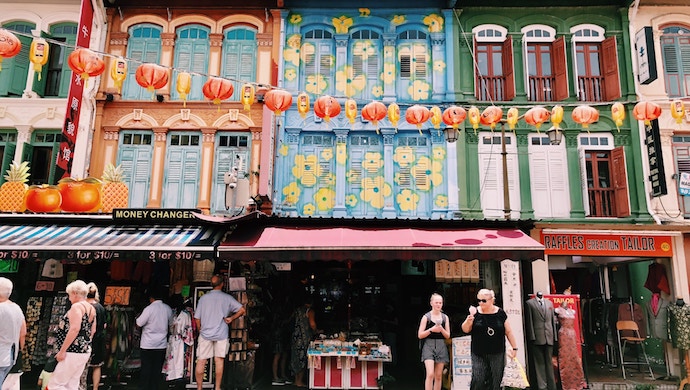
With media agencies representing the world’s biggest brands, to ad tech companies pushing the boundaries of creativity and efficiency, Singapore can be considered more than just a business hub; an Accenture report recently named Singapore as the marketing capital of Southeast Asia.
It reports Singapore as the most competitive marketing region within Asia, outranking Hong Kong, Tokyo and Shanghai thanks to its strong tech start-up ecosystem, its multicultural and multilingual environment, its robust creative services, and the overall ease of doing business.
The city-state also scored highly for talent, marketing innovation, stability, and liveability.
Of course, there will always be bumps in the road. Uncertainties in the global economic climate mean growth in Singapore is subdued, but the economy is expanding and is on track to grow between 0.5 per cent and 2.5 per cent in 2020.
Ad spend declined briefly as advertisers reduced offline investment and focused on building internal and data infrastructure for digital. But overall ad spend looks set to grow more than 4 per cent in 2020, with a far greater increase in digital led by social, video and search.
Dentsu also recently announced cuts in the Singapore office as well as the closure of its global data innovation centre, but at the same time, other international businesses are flocking to set up regional offices here.
As we head into the 2020s, several factors promise the marketing industry an even brighter future in Singapore. These include pioneering technology, the best talent, and a supportive business environment.
A futuristic tech landscape
As one of the world’s most digitally advanced markets, Singapore is the ideal testbed for innovations in advertising and marketing technology. The city-state already has the fastest broadband globally, with average download speeds exceeding 185 Mbps.
Over 98 per cent of internet users aged 16 to 64 own a smartphone, and the mobile network is the fifth-fastest in the world, with the lowest latency. The rollout of commercial 5G will bring even faster mobile speeds next year and at least 50 per cent of the country will be covered by a standalone network in 2022.
Also read: 4 things that make Singapore a startup paradise
Digital media dominates, with high usage levels of video-on-demand, music streaming and connected TV.
Investment in the latest technologies is strong, with a Salesforce study revealing Singapore is the country most prepared for artificial intelligence (AI) in Asia-Pacific. This readiness illustrates the nation’s progressive approach to AI, which includes robust regulatory foundations around data protection and cyber-security, designed to maximise digital tech’s impact on the economy.
Singapore’s strong tech focus paves the way for innovation, and there is a growing concentration of ad tech and martech start-ups, giving it a reputation as the Asian Silicon Valley.
An impressive talent pool
The thriving marketing scene in Singapore is fuelled by a valuable pool of talent, both home-grown and imported.
Two of the nation’s leading universities, the National University of Singapore (NUS) and Nanyang Technological University (NTU) are ranked as the top universities in Asia, feeding businesses with new entrants.
The country also attracts overseas talent, with many global businesses basing regional offices here. Almost two-thirds (62 per cent) of brands headquartered in Singapore said they chose the country because of its access to a diverse range of talent. Moreover, 92 per cent of respondents whose brands are globally centralized, or have regional marketing functions, would consider relocating to Singapore.
Also read: Singapore: The new “place to be” for e-commerce in Asia?
Progressive ideas around employment make Singapore an attractive place to work, with 44 per cent of organisations actively promoting flexible and agile working in their business culture, and 40% implementing diversity and inclusion targets in talent management strategies.
There is also a philosophy of continual learning to deliver an industry-ready workforce. For instance, the IAB SEA+India is collaborating with Workforce Singapore (WSG) and the Economic Development Board (EDB) to design and deliver an industry-wide training programme to provide specialised functional and technical skill sets required for programmatic advertising.
A supportive business environment
The third ingredient contributing to the success of Singapore as a marketing hub is the transparent and supportive business infrastructure.
The government wants to improve the business environment while developing talent and is strategically upgrading its economy, investing in areas such as marketing technology to increase the skills of its labour force and minimise the country’s reliance on trade.
With its high concentration of start-ups, Singapore is considered one of the best places to start a business. Accessing venture capital, either from the government’s financial arms or a state-linked company, is relatively easy, involving minimal red tape. Corruption is virtually non-existent and organisations such as the EDB are totally transparent about what they are investing in. Guidance and advice are readily available, with business incubators and networks ready to lend support.
The groundwork is already laid for a thriving and forward-thinking marketing scene and, as we head into 2020, Singapore looks unlikely to lose its crown as the marketing hub of Southeast Asia.
–
Editor’s note: e27 aims to foster thought leadership by publishing contributions from the community. Become a thought leader in the community and share your opinions or ideas and earn a byline by submitting a post.
Join our e27 Telegram group, or like the e27 Facebook page.
Image credit: Jirath Ninchaikovit on Unsplash
The post What makes Singapore the marketing hub of Southeast Asia appeared first on e27.